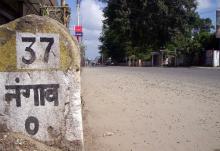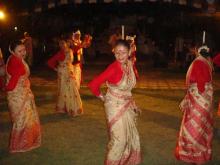The Gauhati High Court directed petitioners Asian Centre for Human Rights and others in PIL No.6/2011 to provide practical and workable solutions to the issue of displacement of the Rabhas and Garos as submitted before the Court pursuant to the respondents States of Assam and Meghalaya and the Union Home Ministry within a week to act upon. It had earlier directed the petitioners on January 22 last to submit practical and workable solutions. Addressing the media persons the petitioner, Suhas Chakma, Director of Asian Centre for Human Rights said that he appeared in person before the Chief Justice, Madan B Lokur. The matter is listed for May 2011 after the state governments take necessary measures,
Chakma contended that ACHR are seeking parity in terms of access to relief and rehabilitation and resettlement for the Rabhas and Garos vis-à-vis the Kashmiri Pundits, Sri Lankan Tamil refugees in Tamil Nadu and the Tamil IDPs in Sri Lanka. The petitioner submitted that in the seventh session of the India-Sri Lanka Joint Commission on 26th November 2010, the Government of India, among others agreed to provide housing for fifty thousand houses for IDPs, supply of 7200 MT of roofing sheets for IDPs in the Northern province and supply of four lakh cement bags to IDPs. No such facilities have been provided to the displaced Rabhas and Garos and provisions of Rs10.000 for rehabilitation as provided by the Assam and Meghalaya governments is too meager that requires court’s interventions.
The practical and workable solutions submitted to the Gauhati High Court on February 7 last are the measures to protect the life, liberty, dignity and worth of an individual displaced by conflicts and residing in the temporary relief camps. Immediately vacate the educational institutions being used as relief camps and start building temporary shelters for those who are afraid to return to their original villages because of the lack of safety and security to lives and liberties.
To provide food supply of 500 grams of rice per day for an adult and 250 grams of rice per day for a minor and two kgs of dal per week for an adult and one kg of dal per minor. In addition a cash assistance of Rs 400 per head of family, Rs.288 for each additional member, who is 12 year old, Rs.180 per child below 12 years and Rs.90 to each of additional children per month as provided to the Sri Lankan Tamil refugees, who are foreigners and sheltered in the camps in Tamil Nadu. It is suggested to provide cooking materials to each family and other utensils for each member of the family and adequate provision of drinking water and bathing as provided under the National Disaster Management Policy and in this regard a tube well for each 10 families be established. Cloths, towels, mats, blankets and mosquito nets for the camp dwellers and special provisions for mothers, pregnant women, elderly and children.
In context of the Garo-Rabha conflict, it is pertinent to mention that over twenty thousand Rabhas fled from Garo-dominated areas in Meghalaya while hundreds of Garos fled from Rabha dominated parts of Goalpara and other districts of Assam. Their houses have been burnt or destroyed. Return of these displaced persons to their original villages is more difficult as there are all pervasive fear.
Considering the need to take security concerns and the need to re-build lives, the petitioner suggested the respondents establish adequate temporary security camps including deployment of the Central Para-military forces in these areas to facilitate the return of the Rabhas of Meghalaya sheltered in Assam and Garos of Assam sheltered in Meghalaya. The security forces should remain at least for a period of six months. The petitioner has prayed that the respondents be directed to restore/ensure the land rights and rights over properties of the original owners and each displaced family whether currently staying in the temporary relief camps or returned to the village and whose house has been burnt or destroyed be given a grant of Rs.48,500 housing assistance to each displaced family under the Indira Awas Yojana as revised on October 4,2010.
The housing allowance be extended to all families if they are forced to stay more than six months in the temporary camps, become ordinary resident of the temporary camps and are able to prove that their houses have been destroyed or damaged during their stay in the camps. Each displaced family be given cash assistance of 41,000 as livelihood restoration as provided in the National Disaster Management Policy 2009 and considering the IDPs have been reduced to destitute, the government should provide free ration of one year to enable them to do the next harvest properly and rebuilt their lives.
The petitioner also prayed for a compensation of Rs.10 lakh as ex-gratia for those killed in the conflict and prayed for a direction to establish a grievance redressal authority consisting of the representatives of the respondents and the petitioners for implementation of the directions to be passed by the Court.







Add new comment